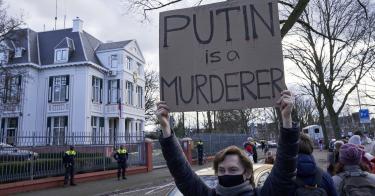On March 2, the United States imposed sanctions on seven Russian officials linked to the poisoning and imprisonment of Aleksei Navalny, the main opposition leader in Russia. At the same time, Washington added fourteen Russian entities “linked to the production of chemical and biological weapons in Russia” to a Commerce Department blacklist.
The seven Russian officials include Federal Security Service Director Aleksandr Bortnikov, Domestic Policy Chief Andrei Yarin, First Deputy Chief of Staff Sergei Kiriyenko, Deputy Defense Ministers Aleksei Krivoruchko and Pavel Popov, Federal Prisons Director Aleksandr Kalashnikov, and Prosecutor General Igor Krasnov.
The United States coordinated the sanctions with the European Union.
What are we to make of this, the first sanctions imposed by the Biden administration?
First, it is commendable that the United States is holding Russia accountable for its transgressions against Aleksei Navalny. In poisoning this Putin rival, Russia completely disregarded the Chemical and Biological Weapons Control and Warfare Elimination Act of 1991. His subsequent imprisonment—for allegedly violating his parole from a prior conviction—is also a blatant human rights violation. Russia cannot be allowed to evade punishment for these offenses, so it is right for the United States to pursue prosecutions.
>>> What You Need to Know About the Arrest of Russian Dissident Alexei Navalny
In this same vein, U.S. Helsinki Commission leaders Rep. Alcee Hastings (D-FL), Sen. Roger Wicker (R-MS.), Rep. Joe Wilson (R-SC), and Sen. Ben Cardin (D-MD) praised the sanctions.
Rep. Hastings said the U.S. actions “signal that we continue to stand with the Russian people,” and that the “United States will always defend those like Mr. Navalny who battle against the opposition of their fellow citizens, fight for basic freedoms, and offer a path to democracy.”
Furthermore, Rep. Wilson asserted that the “Kremlin will insist that sanctions are anti-Russian. On the contrary, there is nothing more anti-Russian than authorities who cheat, harm, and steal from their fellow citizens. … These sanctions provide a concrete check on the bad acts of Putin’s flunkies.”
Second, it is positive that the United States coordinated its sanctions with the European Union, because it signals a renewal of close cooperation with Europe—something largely lacking with the Trump administration. U.S. relations with its European allies have been neglected over the past four years, so it is laudable that the Biden administration is seeking to strengthen those relationships once again. The United States is only stronger with its allies.
Along with this, Rep. Gregory Meeks (D-NY), chair of the House Foreign Affairs Committee, and Rep. William Keating (D-MA.), chair of the Europe, Energy, Environment and Cyber Subcommittee, issued a joint statement:
“These sanctions are not against the Russian people, but are rather targeted at those government officials and entities responsible for the poisoning. It is critical that the international community stand firmly together with one unified voice in condemnation of the Kremlin’s reprehensible use of chemical weapons, repeated attempts to silence political opponents and dissent, and blatant disregard for human rights and the rule of law.”
These four representatives’ words are not in vain, and rightly praise America for taking action against the Russian regime.
There is, however, a concerning aspect to Washington’s decision to coordinate its sanctions with the European Union: the U.S. stance against Russia was likely weakened in the process.
Just last month, in an attempt to establish better relations with the Russian authorities, EU foreign policy chief Josep Borrell visited his counterpart in Moscow. His expressed goal for making the trip was “to seize the opportunity to have a more constructive dialogue.”
However, Borrell’s trip resulted in a clear weakening of the EU stance on Russia. This was especially unfortunate, as the EU was simultaneously preparing to sanction Russia for Navalny’s poisoning and imprisonment. In the end, Borrell’s trip tarnished the efficacy and strength of the EU’s sanctions against Russia.
Thus, it is not necessarily the best situation that the United States directly coordinated its sanctions with the EU on March 2.
Consider what sparked the need for sanctions.
>>> Why Russians Are Protesting the Arrest of Alexei Navalny
In August 2020, Russian agents poisoned Mr. Novalny with Novichok, a military-grade nerve agent. After being put in a coma, he was evacuated to Germany. Following months of medical treatment, he was able to recover.
Navalny decided to return to Russia with his wife Yulia in mid-January and was arrested upon arrival at Moscow’s Sheremetyevo airport. The reason for his arrest—purportedly for violating the terms of his probation while recovering in Germany—is patently illegitimate. His real “crime” is surviving the assassination attempt.
On February 2, Navalny was sentenced to two years and eight months in a penal colony. He is currently imprisoned in Detention Center No. 3, in the Vladimir region northeast of Moscow.
Navalny’s ordeal demonstrates Russia’s disregard for human life and the pursuit of democracy. The United States should continue to take a firm stance against Putin’s abusive regime and aim to lead the free world in holding Russia accountable for its transgressions. This means coordinating with allies, but potentially taking an even stronger stance if needed.
Russia cannot be allowed to escape retribution for its misdeeds and violations of the world order.
This piece originally appeared in The National Interest https://nationalinterest.org/blog/buzz/us-sanctions-russia-commendable-bit-tone-deaf-179293



